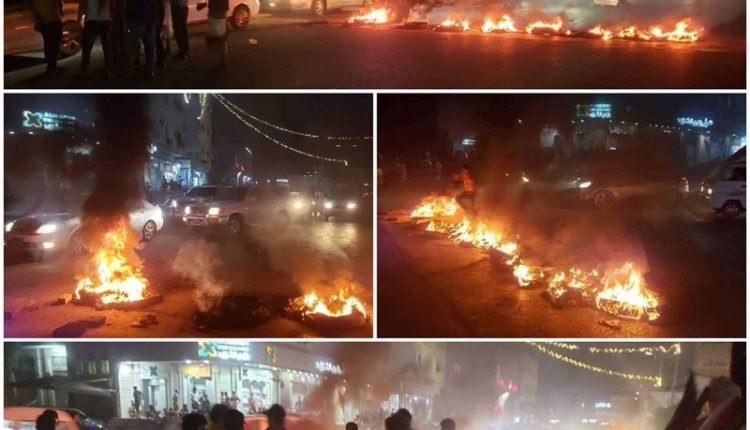Wide Calls for Protests in Aden, Continuation of Cutting off Main Streets
Activists directed widespread calls on Sunday for protests in Aden, southern Yemen, and the closure of roads in protest against the rise in prices of commodities and gasoline.
“We will escalate our protests in the event that prices are not reduced and gasoline is not reduced. For the first time, a popular uprising will be announced to control all facilities. The people will administer it, as they are the owner of the authority and authorized to do so according to the constitution,” activists said.
“We call on the people to act, as there is no more time to wait, as the price hike has killed the citizens,” they added.
On Sunday, massive protests erupted in the city of Aden to denounce a new price dose of gasoline passed by the Saudi-backed government, with the worsening of the deteriorating living conditions.
Sources said that protesters blocked main and subsidiary streets with damaged tires in the Mansoura district, in protest against the oil company’s raising the price of a 20-liter tank of gasoline to 26,000 riyals.
Sources added that the streets of Mansoura, the largest district of Aden, were suffocating in traffic, after protesters prevented the passage of cars, chanting slogans demanding the departure of the corrupt Saudi-backed government.
Angry protests also spread to other streets along the districts of Sheikh Othman and Brega, while many shops closed their doors.
Saudi Arabia, backed by the US and its other regional allies, launched a devastating war on Yemen in March 2015. The eight years of war has killed hundreds of thousands of people and destroyed much of the country’s infrastructure. Yemeni people are facing malnutrition, hunger, and famine, which have increased risks of disease and starvation.
Occupied southern governorates are witnessing a tragic situation, high crime levels, currency deterioration, and rising prices. They have witnessed protests and sit-ins during the last period, due to the worsening humanitarian and economic conditions.
The Yemeni riyal exchange rates continued to deteriorate significantly against foreign currencies in the occupied governorates. The deterioration of the local currency comes as a result of the pro-Saudi government printing one trillion and 800 billion riyals of illegal currency without a cash cover last year, in addition to its acquisition of all fuel revenues in the southern governorates, and their transfer to a special account with the National Bank in Riyadh.

